by Murtada Elfadl
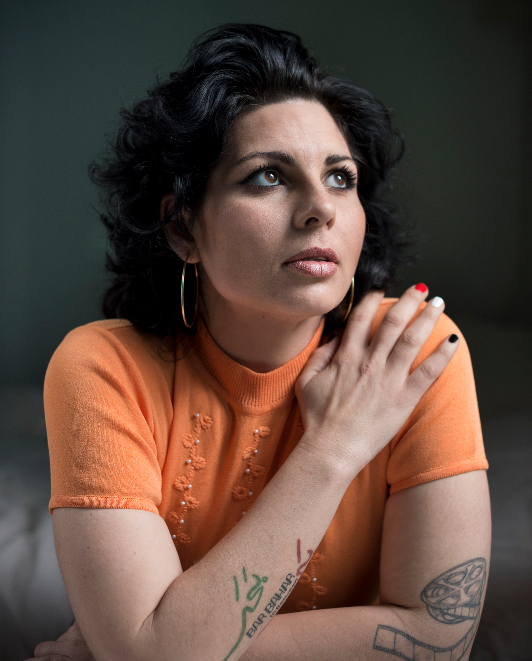 In Between, Arab-Israeli director Maysaloun Hamoud’s debut feature, is about three young, independent-minded Palestinian women who share an apartment in Tel Aviv. Laila (Mouna Hawa) is a criminal lawyer who loves to burn off stress in the underground club scene. Her roommate Salma (Sana Jammelieh,) is an aspiring DJ and bartender who falls in love with a female medical intern. Their new roommate Nur (Shaden Kanboura, Sand Storm) is a reserved, religious university student with a conservative fiancé.
In Between, Arab-Israeli director Maysaloun Hamoud’s debut feature, is about three young, independent-minded Palestinian women who share an apartment in Tel Aviv. Laila (Mouna Hawa) is a criminal lawyer who loves to burn off stress in the underground club scene. Her roommate Salma (Sana Jammelieh,) is an aspiring DJ and bartender who falls in love with a female medical intern. Their new roommate Nur (Shaden Kanboura, Sand Storm) is a reserved, religious university student with a conservative fiancé.
Away from the constraints of their families and tradition, they find themselves “in between” the unfettered lives they are trying to lead and the restrictions imposed on them by their conservative culture. The film has already won several awards including honors at the San Sebastian Film Festival and the 2017 Women in Motion's Young Talents Award at the Cannes Film festival, presented to her by none other than Isabelle Huppert!
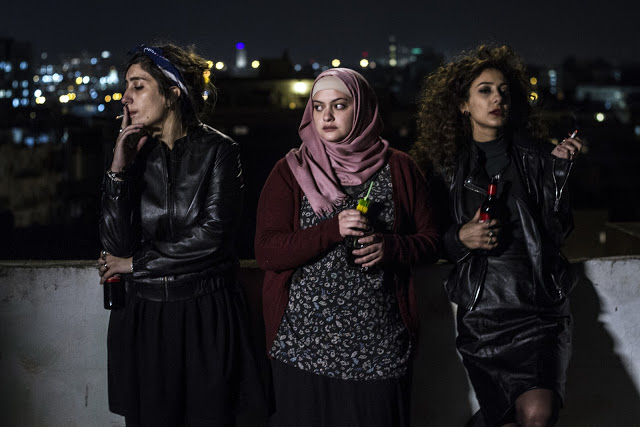
The film is a funny and sensitive portrait of female friendship. Its depiction of the three women at the center, is explosive in its head-on tackling of taboo topics in Arab society, and warm in its care to present multi-faceted characters. We recently spoke with the director Maysaloun Hamoud in New York. [The conversation has been edited and condensed...]
MURTADA: I was excited for your film because it's rare to see a movie in Arabic, specially in New York.
MAYSALOUN HAMOUD: I think it’s rare all over the West, and in Israel. First time that audiences have come out to see a film in Arabic there. They started suspicious, because of the language, even though they see French movies, Romanian movies. But very fast they forgot the language issue and got into the movie.
The movie really plays and gets the audience in. The three friends trope, we’ve seen it a lot in Hollywood, Bollywood and everywhere. Why did you choose it and how did you make it fresh?
The truth is that I was capturing my life. I’ve always had flatmates, different varieties of that. It’s a setup that gives you the challenge of accepting others. I wanted to show different models of Arab women, to represent my generation, my community, my scene which the underground, alternative way of life, and the mainstream we all live in. I thought it was a good starting point, as an allegory for society with different colors and backgrounds. Arabs are not one type. It’s not just Muslims. It’s not just religious fundamentalists. These are stereotypes. I wanted to break the stereotypes. We are humans with different points of view, different desires.
As an Arab queer person I cherished your warm depiction of queer people in the movie - tell me about that?
I am queer in the queer-theory set of mind, but I’m not gay. This was the first ever depiction of queer people in an Arabic movie. It’s a hot potato issue for conservative societies, everywhere not just in the Arab world. However the conversation about it, is different for us. And as long as we don’t represent this huge community, it will never become a topic that we can deal with. I knew that I had to include these queer characters because I lived my life with this community, with this generation. This is my life that I can’t deny. My producer Shlomi Elkabetz is gay, of Arab Moroccan background. His boyfriend is my script editor. We are a family. I had to show that complexity.
Do you think that as an artist, you should reflect society or push ideas forward — or both?
Both. Good art has a responsibility towards the world. Starting with my society as an artist, then the place I live in and to the world in general. Through art we can really change minds. I believe that. That’s my aim. My cinema comes from that conviction. That’s why I wanted to make realistic cinema as influenced by Ken Loach. In his work you can see how daily small life can make you ask bigger life questions. I think I have a responsibility to reflect taboos that we want to deny. My movie cannot be just entertainment without considering the important topics. That’s how I have my say as an artist.
Can you elaborate specifically which taboo topics you wanted to tackle?
Yes of course. We talked about how societies want to deny homosexuality. A lot of people suffer because of that denial. The essence of the movie though is about empowering women. And the liberation we all need, not just women, from the patriarchy. That question of freedom. What is freedom and who decides it? All these provocative acts you see in the film - drinking booze, smoking joints, having sex - are not provocative in my reality. I wanted that in the forefront so that we can see different models of women, because in the end freedom is about choice. It’s OK to choose not to do any of that. The patriarchy though wants to choose for women.
The complex relationships in the film touch upon these provocations - what do you hope people get out of the movie?
Empowering women. Opening parents’ eyes to accept the differences in their children, that they can be secular, religious, conformist. You can be what you want. The point is acceptance. And for me personally, women solidarity and sisterhood is key to changing reality. If women can lead, we will get a better world.
I want to ask you about some specific scenes. There is the scene where Nur dances with Laila where we see the friendship and the love these women have for each other. How did you choose that song, "Aziza".
It’s the hymn of the movie. The singer is Yasmine Hamdan, who’s married to Elia Suleiman, the Palestinian director. Yasmine saw the movie and liked it so we were able to include the song. It fits the story because the lyrics say “lose it, loosen up, be yourself”. There is a soundcloud playlist with all our music including some that didn’t make it in. It also has the catchphrases from the movie.
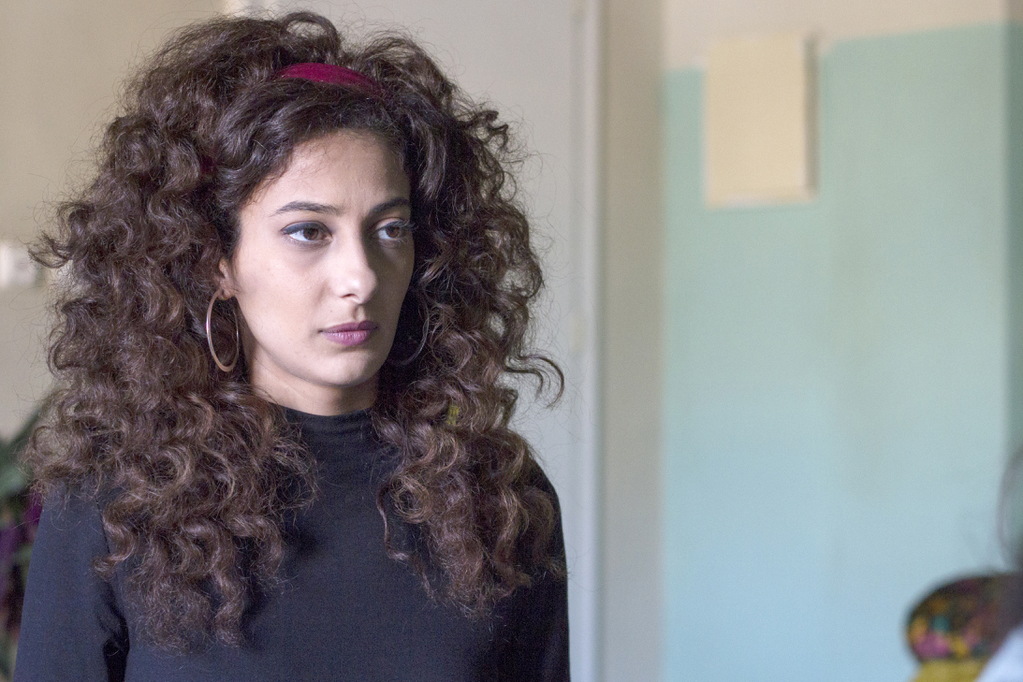
MURTADA: All your actors are great but I was particularly struck by Mouna Hawa who plays Laila.
MAYSALOUN HAMOUD: She just won the Israeli Academy Award for our film!
You mentioned that you hired a mix of professional and nonprofessional actors. How was that?
There was no difference really. Because I didn’t want them to act, I just wanted them to be. They know these situations, they’ve lived them. They just needed to be there and be themselves. My job was to remind them that we don’t want to see them “act”.
Ken Loach, who is known as a socially conscious filmmaker, is an influence for you. Who else?
Pedro Almodovar. If the realistic came from Loach, then the love for women’s stories came from Almodovar. Locally Ajami by Scandar Copti and Yaron Shani was a reference. They showed our daily lives and dilemmas as Israeli Palestinians and not Palestinians from the West Bank or Gaza. Ajami is the closest movie to me from local cinema.
Do you see yourself continuing a tradition in Arab cinema?
I grew up with Egyptian cinema and I love a lot of directors who worked there. I appreciated them more when I put into context the time in which they worked. What they brought is fascinating. Youssef Chahine and Mohamed Khan. Salah Zulfikar. Amazing work starting from the 50s to the 8os before the collapse of the industry in Egypt. As good as some of the work in France or America. Egyptian cinema basically started with Hollywood. These movies really affected me.
The director who really made want to make movies is Ziad Doueiri and his film West Beirut (1998). I love that movie! It represented a wind of change in Arabic cinema. He grew up in the American industry, he’s a friend of Tarantino. I really appreciate his work and looking forward to seeing his latest, The Insult.
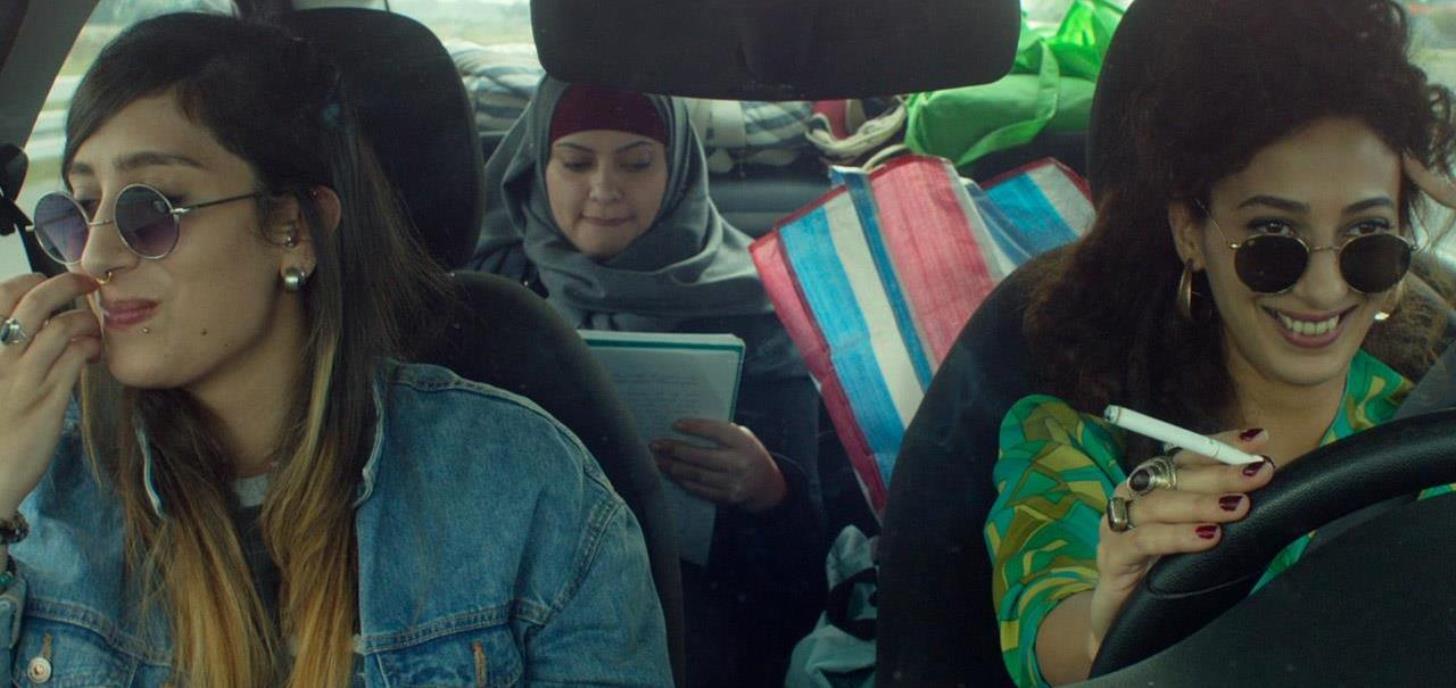
MURTADA: You mentioned Mohamed Khan, your movie reminded me of his 1987 film The Dreams of Hind and Camilla.
MAYSALOUN HAMOUD: Thelma and Louise the Egyptian version! There is a scene in the film - when they are in the car waiting for Nur - I called that my Thelma and Louise scene.
Politics are in the movie. We see the racism against Palestinians, subtle but palpable. Why keep it in the background?
Everything is politics. When you want to change power from men to women, that’s politics. When you think about Palestinian movies, you immediately think about movies about the conflict, the occupation. That’s not coming from a vacuum, it’s the reality. I like it to be more sophisticated. I trust my audience, I don’t have to give it to them in a spoon. We feel racism everywhere, in the bus,in the street. This is political but not in the controversial way we usually see. In the process of getting mature as a nation, we need to talk about Palestinians in Israel. It’s our duty. So I didn’t want the focus to be the conflict in the West Bank or Gaza.
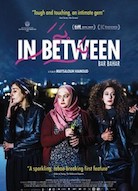 You show people of different religions - Muslim, Christian… practising and secular.
You show people of different religions - Muslim, Christian… practising and secular.
Going back to the stereotypes we talked about before. Usually when we think of Arabs, we think Muslims. People might not know that there are Arab Christians, or secular Muslims. Arabs are not a monolith. So I wanted to show all the multitudes that we have. But the patriarchy crosses over all of us.

In Between opens Friday January 5th in New York City, followed by a national rollout.